I used to be sceptical of self-help books and was under the impression that they were full of fluff designed to reel in only the people who couldn’t ‘help themselves’. That was until I read The Personal MBA by Josh Kaufman – on the face of it this was a business book so it managed to bypass my prejudices. In addition to the business stuff though, the book also contained various lessons and ideas for ‘getting more from your brain’ which I found to be surprisingly useful and insightful.
And so my mind changed, and I went about seeking out more self-help books. Sure there was some nonsense out there as I suspected, but there was also a lot of sound advice that I found very useful.
Furthermore, thanks to my degree in psychology I noticed that a lot of the ideas and principles in these books were founded on real psychological research and theories, and had simply been retooled to suit a new audience. This gave me the ability to skim-read the concepts and make the connections without going into too much depth, and it meant that I had a better than average ‘bull-shit metre’ for discounting the useless ideas.
In other words I very quickly was able to assimilate the best ideas from a range of self-help books and start applying the ones I liked to my daily routine. And to save you the trouble of reading all those books, I thought I’d share my findings here.
Self-help books can be very useful you see, but even the best ones tend to go on a bit when they could get their message across much more quickly. Here are some of the best lessons, ideas, principles and techniques from those books but condensed into a few minutes’ worth of reading…
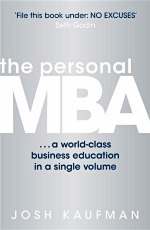 The Personal MBA by Josh Kaufman
The Personal MBA by Josh Kaufman
I recommend actually reading this one, it has a lot of good ideas, and the following are only taken from the self-help sections.
• Use ‘cognitive simulation’ to realistically imagine what would happen in a number of scenarios. Use this to come up with contingency plans, to eliminate paralysing fear, and to make decisions.
• Cognitive biases are a range of ways in which we don’t think objectively. Absence blindness makes us more likely to notice things that shouldn’t be there, than things that are absent but can be combated with checklists. Confirmation bias means we’re more likely to listen to and seek out information that confirms our existing beliefs but can be dealt with by having an honest advisor and by seeking out conflicting information.
• Loss aversion means we’re more likely to avoid loss than seek out gain and prevents us taking risks. Risks in businesses and relationships are to be encouraged, so be more mathematical in your decision making.
• ‘Contrast’ can make something seem like a much better deal to a buyer. Put your cheap item next to a pricey one to make it much easier for a buyer to ‘justify’.
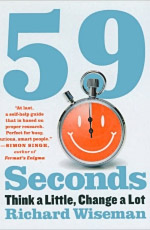 59 Seconds: Think a Little, Change a Lot by Richard Wiseman
59 Seconds: Think a Little, Change a Lot by Richard Wiseman
This book is aimed at providing only evidence-backed suggestions and showing how they can be implemented in under a minute. It’s another very good one that’s actually worth a read. The following are just some highlights.
• The desire to reciprocate is incredibly powerful. If you want to get something from someone, then just try giving them something first. This is why they always give you a cup of tea in Turkish markets and try to force free gifts onto you.
• Due to ‘facial feedback’, just smiling can make you feel much happier and more positive.
• The ‘Zeigarnik Effect’ meanwhile occurs describes a kind of ‘psychic energy’ and restlessness we experience when a task is incomplete. You can combat procrastination by simply working on your project for a couple of seconds – your brain will then nag you until you complete it and you won’t be able to resist.
• Visualisation isn’t all it’s cracked up to be – apparently imagining yourself being highly successful and accomplishing all your goals makes you less likely to do so. What works far better is to come up with a realistic plan.
• People rate other people higher if they have done them a favour. In other words, contrary to what might seem intuitive, asking people for favours can actually make you more popular (as long as they’re small).
• The colour green can help to stimulate creativity. Get a pot plant for your desk!
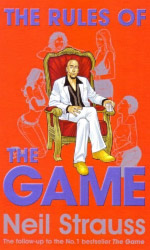 The Rules of the Game by Neil Strauss
The Rules of the Game by Neil Strauss
The Game is a dating book that’s gotten a lot of media attention thanks to the ‘underground’ internet culture surrounding it, and the success stories of some of the advocates. I can’t whole-heartedly recommend it as it’s all a bit sleazy, but it certainly has some good ideas. Which you can read here…
• Get over the fear – The Game recommends using some techniques that are recommended in cognitive behavioural psychology in order to get over the fear of rejection. This involves gradually exposing yourself to more and more awkward social situations to the point where you will start to learn that it’s no big deal to be turned down. To this end the book recommends challenges such as calling a random stranger up and having a conversation, or striking up conversations with people in public.
• Evolutionary psychology also underlies a lot of the ideas in the game. By losing all social inhibition you make yourself more confident and thus seem like more of an alpha male. The idea then is that women think ‘he must have a reason for being so confident’ and assume that you’re really strong or very rich – thus you become more attractive.
• ‘Peacocking’ involves wearing a funny hat or eye makeup in order to demonstrate this confidence and lack of social inhibition. It makes people take notice of you, and makes them assume you’re fearless. Both of which are good.
• ‘Negging’ involves using put-downs to subtly undermine the person you’re hitting on but dressing it up as a compliment. For instance ‘That’s a great dress, I bet it would look fantastic on a blonde!’. The idea is not only to distinguish yourself from all the other fawning chumps, but also to make her think that she’s the lucky one to be talking to you rather than the opposite being true.
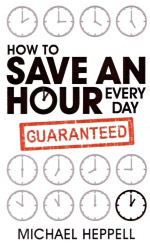 How to Save an Hour Every Day by Michael Heppell
How to Save an Hour Every Day by Michael Heppell
I was initially sceptical about this one after receiving it as a gift from my girlfriend, but on looking inside it redeemed itself with some great ideas. That said, you can save much more than an hour by using the bullets below instead of reading the whole thing.
• Throw out lots of stuff – you may not realise it, but all the junk you keep around the house eats into your time because it needs to be cleaned and organized, while at the same time creating unwanted psychic clutter. If there’s a box on your wardrobe you haven’t looked in for 6 months or more, then take out anything valuable or sentimental, and then throw it out. You won’t look back and you’ll feel liberated.
• Use a reward system to avoid procrastination. The temptation is to try and complete little tasks first like checking e-mail or texts, but inevitably this leads to your browsing the web and wasting time in other ways. Instead, do an hour’s worth of work first and only then check your e-mail for five minutes as a reward. Then do an hour’s work and make a tea etc. This way after two hours you won’t have browsed the web for an hour and worked for half an hour before making tea, you’ll have worked for two hours and done 110 minutes’ worth of work (though you’ll find it’s often more as you won’t want to stop when you’re on a roll).
• Learn to say no to friends and family when you genuinely don’t have time to do something. Sounds obvious, but lots of people struggle with this.
• Avoid distractions that destroy the ‘flow state’ – the magical state of mind where we work without thinking about anything else.
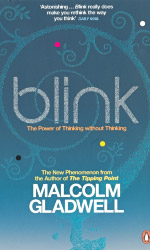 Blink: The Power of Thinking Without Thinking by Malcolm Gladwell
Blink: The Power of Thinking Without Thinking by Malcolm Gladwell
This book is more of a theory book than a self-help guide, but you can certainly apply the lessons therein by taking out the core message. Which is…
• ‘The adaptive unconscious’ is our ability to make decisions without consciously engaging in the subject which is due to the amount of information available to our unconscious mind that we don’t have access to (including a whole host of memories and all the subtle little cues we don’t notice). This emerges in the form of a ‘gut feeling’ that is often quite immediate.
• There are limitations to the adaptive unconscious – it is prone to prejudice and generalization. As such then, you shouldn’t use it in place of reason, but when you can’t make a decision based on numbers trusting your gut may be a good alternative.
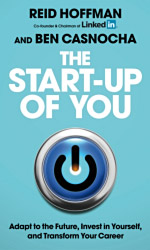 The Start-Up of You by Reid Hoffman and Ben Casnocha
The Start-Up of You by Reid Hoffman and Ben Casnocha
Reid Hoffman founded LinkedIn so he’s worth listening to. That’s not to say that the best ideas from his book can’t be summarised in two points though…
• Make an ‘interesting people fund’. This is some money that you’ve put aside for coffee and food that you will use to network with interesting people.
• Think about the ten people you’d contact if you lost your job or your business went under – now contact them. Rather than getting in touch just when you need something, lay the groundwork as insurance and they’ll be more likely to help should you ever need them (and even if you don’t think you do).
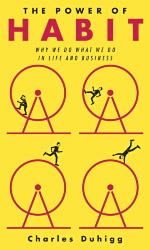 The Power of Habit: Why We Do What We Do in Life and Business by Charles Duhigg
The Power of Habit: Why We Do What We Do in Life and Business by Charles Duhigg
Habit is a very powerful tool, but thankfully it’s also very simple…
• Make your bed every morning. Starting this one simple good habit is a great step to starting others.
• Pick a cue to remind yourself to do the habit. It’s easy to forget to do things regularly, so use a cue such as practicing mental arithmetic ‘whenever you’re on the train’.
• Have a clear reward for your good behaviour and you will condition yourself to do it more often.
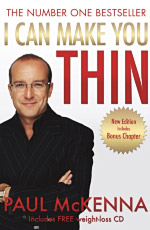 I Can Make You Thin by Paul McKenna
I Can Make You Thin by Paul McKenna
Okay so I haven’t actually read this one, but my cousin found it useful and passed on some useful tips from the book that can help with dieting.
• Never finish your food – always leave a little at the bottom of your bowl.
• Get smaller crockery and cutlery for your home, you’ll naturally eat less.
• Eat more slowly and enjoy the food – consciously focussing on it will help you to recognize when you’re full and eat less as a result.
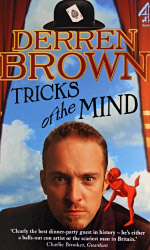 Trick of the Mind by Derren Brown
Trick of the Mind by Derren Brown
Derren Brown is an illusionist, mentalist and cynic who I greatly admire. I actually recommend reading his book because the art of misdirection and the memory mastery techniques aren’t things I can pass on in bullet points. However he does have one very simple piece of advice for ‘making friends and influencing people’ that makes a lot of sense…
• Be a nicer person – if you want to make friends and influence people then there’s not much better to do than just do more nice things for people and be polite. People like nice people…




